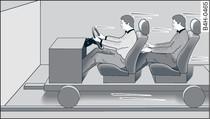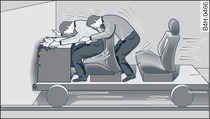
- Fig. 1 Passengers of a vehicle which is headed for a brick wall. They are not using seat belts.

- Fig. 2 The vehicle crashes against the wall
Very large forces are generated during a collision; these forces have to be absorbed.
The physical principles involved in a frontal collision are relatively simple:
Both the moving vehicle and the passengers possess energy, which is known as "kinetic energy" Fig. 1. The amount of "kinetic energy" depends on the speed of the vehicle and the weight of the vehicle and passengers. The higher the speed and the greater the weight, the more energy there is to be absorbed in an accident.
The most significant factor, however, is the speed of the vehicle. If the speed doubles from 25 km/h to 50 km/h, for example, the kinetic energy increases by a factor of four. Because these passengers are not restrained by seat belts, the entire amount of kinetic energy has to be absorbed at the point of impact Fig. 2. This would result in serious or potentially fatal injury.
Even at urban speeds of 30 km/h to 50 km/h, the forces acting on the occupants in a collision can reach the equivalent of 1 ton (1000 kg) or more. At greater speed these forces are even higher. Again: if the speed doubles, the forces increase by a factor of four.
Passengers who do not wear seat belts are not "attached" to the vehicle. In a frontal collision they will continue to move forward at the speed their car was travelling just before the impact.
